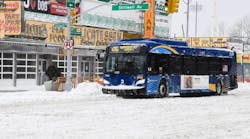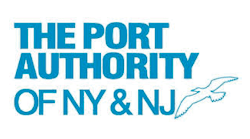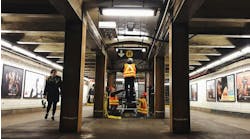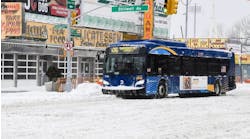The Transit Tech Lab (TTL) has selected 19 companies to collaborate with transit agencies operating in the New York area to test technologies designed to support the agencies’ objectives in customer experience, climate resilience and curb management.
The Customer Experience, Resilience and Curb Activity challenges were revealed in January 2024 and solicited 150 applications from around the world. Applicants were asked to demonstrate how their solutions can improve customer experience, build a more adaptive transit system and maximize the utility of curb areas on New York City (NYC) streets.
The companies selected will deploy their technologies during an eight-week “proof of concept” period with one or more of the participating agencies, including the Metropolitan Transportation Authority (MTA), the Port Authority of New York and New Jersey (PANYNJ), New Jersey Transit (NJ Transit) and the NYC Department of Transportation (DOT). The proofs of concept will leverage Artificial Intelligence (AI), Light Detection and Ranging (LIDAR) and other smart technologies to improve transit operations.
Customer Experience Challenge
NYC regional transit agencies are looking at ways to better communicate service changes, reduce delays and augment safety and cleanliness initiatives:
- BusPas (Montreal, Québec, Canada) – Provides next-generation wayside signage that delivers real-time, ADA-compliant passenger information. The company also uses AI and computer vision to provide decision-making insights such as shelter cleanliness. Partner agency: NJ Transit.
- CloudMonitoring/REMS Plus LLC (Queens, N.Y.) – Provides real-time tracking, AI-driven insights and predictive data to improve maintenance of critical equipment. Partner agency: MTA
- Convo Communications (Austin, Texas) – Transforms interactions for deaf sign language users into seamless experiences, ensuring communication autonomy with mobile devices. Partner agencies: MTA, NJ Transit and PANYNJ.
- GoodMaps (Louisville, Ky.) – Utilizes LiDAR and advanced computer vision to create accurate digital maps, precise indoor positioning and inclusive turn-by-turn navigation without installation of equipment or hardware. Partner agencies: PANYNJ and NJ Transit.
- Urban Solar (Beaverton, Ore.) – Provides ultra-low power displays that deliver ADA-compliant real-time information and messaging to transit users at bus stops with less than 10 second latency content updates and dusk-dawn screen illumination while operating solely on battery power for up to five years between battery replacements. Partner agencies: NYC DOT and NJ Transit.
- Velocia (Toronto, Ontario, Canada) – Enables clients to incentivize, subsidize and reward pre-defined rider behaviors based on a pay-for-performance model once a designated behavior has been achieved and validated. Partner agencies: MTA and PANYNJ.
Resilience Challenge
The regional transit agencies are looking at ways to build a more resilient and adaptive transit system:
- Advanced Rail and Transit Solutions, Inc (Manahawkin, N.J.) – Provides an internet of things telematics device paired with LiDAR that can optimize the electric vehicle (EV) charging process and provide visibility into passenger flows. Partner agencies: MTA and PANYNJ.
- AlphaRoute (Waltham, Mass.) – Provides a web-based optimization tool that augments the performance of legacy paratransit scheduling systems to improve service, maximize efficiency and generate substantial cost savings. Partner agency: MTA.
- Cascara Energy (Toronto, Ontario, Canada) – Develops an innovative cooling system that extracts heat from NYC subways, providing high-efficiency cooling to the transit system while repurposing the extracted heat to supply low-carbon hot water or steam to nearby buildings, offsetting natural gas usage. Partner agency: MTA.
- FLX Solutions (Bethlehem, Pa.) – Manufactures the FLX BOT handheld robot that enables maintenance in hard-to-reach locations, reducing costly downtime of key equipment. Partner agencies: MTA and NJ Transit.
- Intelligent Security Systems (Woodbridge, N.J.) – Provides under-train and vehicle surveillance systems for automated visual inspection of all types of rail car and vehicle undercarriages. Partner agencies: MTA, PANYNJ and NJ Transit.
- irmos technologies (Zurich, Switzerland) – Provides an AI-powered health tracker for buildings and bridges that minimizes risks and enables predictive maintenance planning. Partner agency: PANYNJ.
- QEA Tech (Markham, Ontario, Canada) – Conducts building envelope audits using AI and drones to quantify energy loss and recommend targeted retrofits that maximize energy efficiency and return on investment. Provides building envelope energy audits using drones, thermography and proprietary AI software. Partner agencies: MTA and PANYNJ.
- Voltpost (New York, N.Y.) – Retrofits lampposts into a modular and upgradable EV charging platform powered by a mobile app. Partner agencies: MTA and NJ Transit.
- Flower Turbines, Inc. (New York and Texas) – Makes small, game-changing wind turbines for many uses, including urban settings, that can add resiliency to power systems and charging stations. Partner agency: PANYNJ.
NYC DOT’s Curb Activity Challenge
NYC DOT is looking to maximize the city’s curb space to serve the multiple and varied needs of New Yorkers:
- AIWaysion (Seattle, Wash.) – Provides an integrated camera, edge computing board and communication module within one unit to monitor curb parking events. Partner agency: NYC DOT.
- AppyWay Ltd (London, United Kingdom) – Utilizes LiDAR imagery and existing curb data to provide a comprehensive digitized curb inventory, enabling municipalities to fully manage curb regulations, parking permissions and payments and unlock net zero mobility. Partner agency: NYC DOT.
- Populus (San Francisco, Calif.) – Provides a digital curb management software enabling municipalities to better understand curb demand, inventory and manage curb regulations and actively manage new curb use cases with hardware-free smart zones. Populus integrates data from parking meters, sensors, cameras and mobile pay, along with curb regulation inventories into a robust platform to improve curbside safety and efficiency in cities. Partner agency: NYC DOT.
- Seyond (Sunnyvale, Calif.) – Provides integrated, privacy-sensitive tracking of vehicles and pedestrians using LiDAR. Partner agencies: NYC DOT and NJ Transit.
The TTL notes the challenges mark the sixth iteration of the Transit Tech Lab, which has helped the regional transportation network improve subway signaling, curb management, transit accessibility and mitigate extreme weather conditions. Since 2018, the TTL has fielded more than 900 applicants, tested 51 new technology solutions, piloted 35 integrated solutions and deployed 11 at scale.
“The Transit Tech Lab is thrilled to announce its largest-ever class – a remarkable cohort of 19 innovative companies that are well-positioned to measurably improve key aspects of our transit system. The lab is an essential part of the Partnership Fund’s broader effort to advance the application of technology that serves the public interest. We are so proud that it has become an enduring model of effective public-private collaboration and we look forward to another year of impactful accomplishments,” said Stacey Matlen, senior vice president of innovation at the Partnership for NYC.
“Enhancing customer experience and making our system more resilient are two of MTA’s central goals. We’re excited to see how this year’s cohort of companies will apply cutting-edge technology to address these pressing challenges,” said Jessica Mathew, senior advisor for policy and special projects at MTA.






